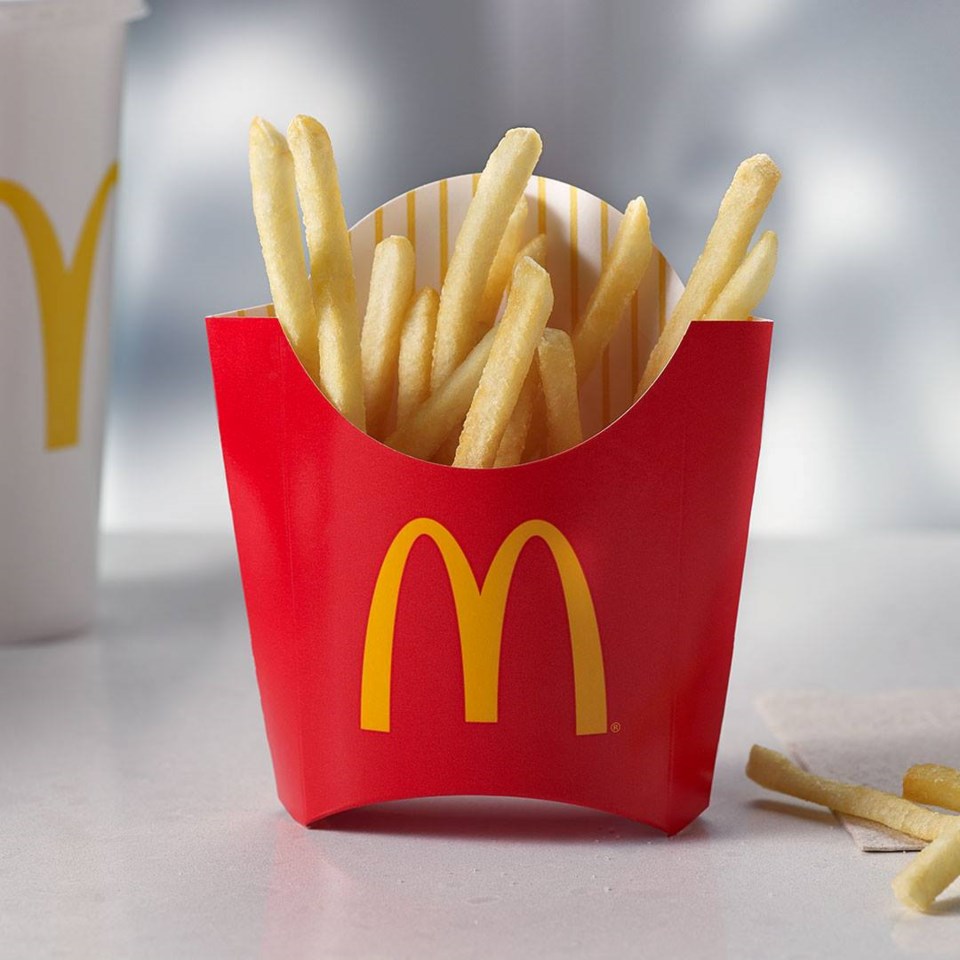Nearly 3,000 McDonald’s locations across Japan are being forced to ration French fries over the holiday season after a shipping bottleneck in Â鶹´«Ã½Ó³»created a potato shortage an ocean away.
On Dec. 21, president and CEO of McDonald’s Japan Co. Tamotsu Hiiro said in in a translated statement its locations usually ship potatoes through Â鶹´«Ã½Ó³»on a large scale.
But recent flooding and the ongoing impacts of COVID-19 have forced the iconic fast-food chain to take drastic steps. From Dec. 24 to Dec. 30, McDonald’s Japan will suspend the sale of medium- and large-sized French fry orders — instead, rationing out the fries in small-sized portions.
In an email to Glacier Media from McDonald’s Japan, the company said the move is a “proactive measure” and that there have so far been no “breaks in supply.”
The potato shortage comes only days before many Japanese fast-food diners descend on chains like McDonald’s and Kentucky Fried Chicken in droves — a holiday tradition in Japan.
The small fry news was met with big reactions from customers in Japan.
“A truly disastrous end to 2021,” wrote one British transplant on Twitter.
“The end of the world (as we know it) is here,” wrote another.
YOUR ONLINE SHOPPING SPREE AND THE JAPANESE SPUD SHORTAGE
The Japanese potato shortage is the latest disruption in a global supply chain under significant pressure over the past 18 months.
Over that time, COVID-19 has led more people to stay home, spending money in an online shopping spree rather than at a restaurant, a movie theatre or to travel, explains Trevor Heaver, a professor specializing in supply chains at UBC’s Sauder School of Business.
As more North Americans buy goods produced in Asia, the cost of shipping a container of goods west across the Pacific has soared roughly 150 per cent since last year, according to the U.K.-based. shipping consulting company Drewry.
That’s meant shipping companies have every incentive to dump cargo in a port like Â鶹´«Ã½Ó³»and immediately send the empty container back to China for another high-value trip back to North America.
“The steamship lines are just running the containers empty,” says the former head of a Vancouver-based importer.
With so many containers going back at once, ships are overwhelmed, leading to long waits, from English Bay to ports in Seattle and Los Angeles.
At one point Wednesday, 44 ships were floating off the coast waiting to dock at one of the port authority’s berths. Why is this happening several weeks after the flood?
Think of it like a traffic jam, says Heaver.
A cascade of events — from increased shopping at Christmas to a ship blocking the Suez Canal — compound delays, one on top of the other, until for some businesses at the far end of the supply chain, the system breaks.
“When cars back up at the entrance to a freeway, it takes a hell of a lot longer to get rid of that backup than it did to create it,” says Heaver.
A FROZEN COMPLICATION
McDonald’s is particular about its potatoes. When the company first franchised out its locations in the 1950s on its path to becoming a global behemoth, it only fried the Russet Burbank potato. Now, the company accepts six varieties of Russet, plus the Shepody potato, which is mostly grown in Canada.
What do they all have in common? They “have gone through extensive testing to determine if they will fry up crisp and light in colour with a mashed potato texture inside,” according to the Idaho Potato Commission.
Ross Johnson, the commission’s international marketing director, says Japanese import restrictions on raw vegetables mean McDonald’s French fries have to be processed in North America before they are shipped.
Companies like McCain, Cavendish Farms, Lamb Weston and J.R. Simplot are among a small handful of processors that cut, prepare and export McDonald’s French fries from North American farms to fast-food locations around the world.
Whether from Idaho or Washington, every French fry a Tokyo resident pops in their mouth has spent weeks on refrigerated shipping containers known as reefers.
When a reefer full of French fries arrives in Â鶹´«Ã½Ó³»waiting for a ride to Japan, it needs to be plugged in. But with containers piling up at ports, space for even a regular sea can is hard to find.
At sea, there are only so many ships that can plug in a refrigerated container, adding another bottleneck.
So when in mid-November a tongue of warm, moist air dumped record rain across southern B.C., knocking out the rail lines and highways that feed this already strained system, everything came to a head.
As a spokesperson for the Â鶹´«Ã½Ó³»Fraser Port Authority said in an email, “B.C.’s recent flood-event exacerbated supply-chain challenges already occurring on the west coast of North America.”
MOVING AWAY FROM ‘JUST-IN-TIME’
Heaver says companies around the world are beginning to question the just-in-time ethos that has dominated the import and export business for decades.
First made popular on Toyota’s automotive production line, the just-in-time model means a company doesn't need to keep a large inventory, helping them cut costs. But in an unpredictable world, 'just-in-time' shipping has a hard time adapting to the shocks of a pandemic and more frequent extreme weather.
Just like a family preparing an emergency kit packs an evacuation plan, extra water and freeze-dried food, businesses need to create backup plans, says Heaver.
Instead of just-in-time shipping, he says, keep more inventory on hand. And when that runs out, a company better have other sources to supply their hungry customers.
Until then, Japanese French fry junkies will have to make do with a 0.56 cent discount.

